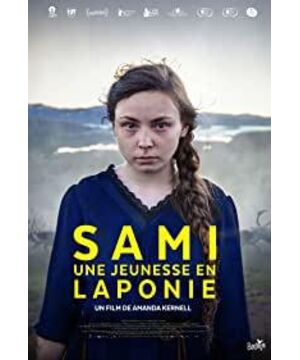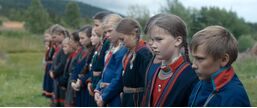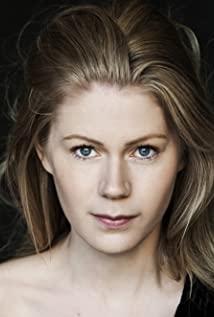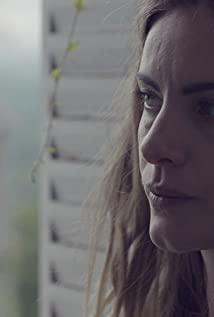The film is the feature debut of Swedish director Amanda Kernell . In 2016, she won the Jury Prize and Best Actress Award at the 29th Tokyo International Film Festival. The film tells the story of the growth of a 14-year-old girl, Ella Maya.
The movie begins with an old woman returning to her hometown to attend her sister's funeral. Her son Ole drove her there, along with the old woman's granddaughter, Saunder. They bought her some music from the old woman's hometown, but the old woman didn't seem to like it oddly. Even, there is also a disgust for the hometown people.
At the funeral, she was even more restless. My sister's husband asked her why she never came back all these years? He told the old woman that the younger sister had never forgotten her sister and had been grazing her deer. The old woman was still indifferent, and at the party after the funeral, she said to her son, "We should go." After that, she ran away alone, and no one could stop her.
Why is the old woman so disgusted with her hometown? What made her so indifferent to her sister? This also starts with a past event 80 years ago.
Ella Maya , 14 , is a Sami reindeer girl. Her father died young, and her mother took her and her sister to live in the mountains. On weekdays, Ella Maya often helps her mother share housework. As an older sister, she also takes her younger sister, who is away from home for the first time, to school. At school, she excelled and was at the top of her class. The teacher taught the students Swedish, so they were forbidden to speak the Sami dialect. In the classroom, the teacher asked to recite the Swedish texts, which Ella Maya knew very well. The female teacher, Christina, is beautiful, elegant, and very intellectual. She is the kind of woman Ella Maya yearns for.
At Christina's invitation, Ella Maya came to the teacher's house. The teacher taught her how to drink coffee and brought her favorite poems for her to read. The teacher gradually became Ella Maya's spiritual idol and had a profound influence on her. Behind this lies the inferiority of one culture in front of another, and at the same time, it is also closely related to the racial discrimination against the Sami by the locals.
The Sami, also known as the Lapps, are a nomadic people living in Sweden, Norway, Finland and the northernmost tip of Russia. They live mainly on reindeer and have their own culture and music. The Joik that appears in the film is a unique singing method of the Sami people.
However, many people do not know that Sweden used to discriminate against the Sami people in the last century. Even in the 1970s, the Swedish government was sterilizing the Sami because they considered them "primitive" and unworthy of reproduction.
Therefore, we can more or less feel the malicious discrimination that the Sami people encountered in the film. For example, Ella Maya was dismissed by the boys as she passed by the school, saying that the Sami always smelled like hell. For another example, it is normal for a doctor to come to the school to examine the students. But they suddenly asked Ella Maya to take off her clothes and let him take pictures and study. This has fully proved that the local people did not treat the Sami people as human beings at all, but more regarded them as "livestock" like reindeer.
However, this is not the end of discrimination.
Ella, who was humiliated, came out of school and was mocked by the boys as a "circus monkey". Ella demanded an apology from the boy, but was instead besieged by a group of boys, pinning her, a weak woman, to the ground and cutting her ear with a knife. Ella wakes up. She was reflecting on whether all of this was her fault as a Sami. She came to the river hoping to wash off the smell of reindeer from her body. She stole a dress from her teacher and wore it to the Swedes' dance. There she met the Swedish boy Nicholas Vikander , and the ignorance of youth made Ella fall in love with him. The boy was also quite fond of her, and told Ella that he lived in Uppsala.
In order to keep this love going, and at the same time, to escape from the hometown that bored her everywhere, she applied to her teacher to go to Uppsala to go to school. But the teacher decisively rejected Ella, she told Ella——
Scientific research, your people are not fit to live in the city. Your brains do not have the basic structures that urban crowds require. You must live at such heights or you will die.
From here, Ella breaks with her Sami identity. She snatched her sister's silver belt, exchanged it for a coil, and set foot on the train to Uppsala. This is without a doubt the best scene in the film.
A Sami girl, fleeing her hometown in the vast wilderness. She hurriedly ran, ran, with determination and determination on her face. It seems that everything about her hometown has been left behind by her. However, after arriving in Uppsala, she could not find a place to live. In desperation, he had to find the home of Nicholas Vikander, the boy he met at the dance. The boy is not at home, and Ella lies to the boy's parents that Nicholas asked her to come. Ella was eating with the boy's parents and was asked what her name was and where she was from. She replied with the teacher's name, Christina, and falsely claimed to be from Smallan.
The boy's father, Gustav, was a real Smolan, and when he asked in detail where Ella lived in Smolan, her answer was hesitant and ambiguous. When the boy returned, the parents forced the boy to send Ella away. Because, they seem to have seen the fact that Ella is actually a Sami. Naturally, the boy couldn't beat his parents and sent Ella out of the house.
Ella did not give up, she came to the school library in Uppsala. Here, she applied to the school to study, and finally got permission from the principal. She came to school and started her first physical lesson in her life. She had never taken this course before, so she had no choice but to follow her classmates' poses. Here, she puts on lipstick for the first time. It was also here that she began to discuss all kinds of clothing collocations with local girls. The education here gave her a new perspective, helped her grow, and made her life more colorful.
However, the school's tuition fee notice came down, 2 semesters, 200 kroner . This is an astronomical figure for Ella, who is of Sami origin. She went to her boyfriend Nicholas to borrow money, and her boyfriend said why don't you go to your parents to borrow money. Ella replied that her father had died, her mother was herding reindeer, and the family was destitute. Only then did Niclas realize that Ella was really a Sami, and many of the previous remarks turned out to be lies, so he left with a displeased face. Ella went back to the mountains, found her mother, and handed her the school's tuition notice. Mom replied that the name on it is not you, you are not Christina. Ella said more decisively, "I don't want to be Ella Maya anymore . " She wants to sell her father's reindeer, or her father's silver belt, for enough money to pay for school. The mother flatly refused.
The mad Ella Maya took out the housekeeping skills of reindeer and hunted down the reindeer in the field. She used her unique and extraordinary courage in exchange for her father's silver belt. From then on, she said goodbye to her hometown and never came back. It was not until her sister's funeral eighty years later that she was allowed to return to her hometown again.
That's right, the old woman at the beginning is Ella Maya.
At the end, after staying in the hotel for a long time, she faced her hometown thoughtfully. Finally, before she came to her sister's coffin, she opened the coffin door, lay with her sister, and begged her forgiveness guiltily. After that, she climbed to the top of the mountains alone, overlooking the earth. I saw the vast wilderness, reindeer in groups. She walked slowly back to the land of her hometown. There was a green grassland in front of her, and only the wind was blowing softly in her ears.
Throughout the whole film, Hannah Ostrom 's acting skills are remarkable. She shows the growth and transformation of a teenage girl who experiences racism. When she was young, Ella Maya used to sing Joik softly when they were rowing across the river with her sister. The relaxation and freedom of the whole body at that time came from her recognition and resonance of the Sami culture. She said to her sister, "If you can sing it with Joik, you will feel at home".
In her old age, when she returned to her hometown again, she heard about Joik at her sister's funeral. At this time, she had been immersed in the Swedish elite education for a long time, and she had already resisted the Sami culture.
However, as Ruan Yizhong, a famous contemporary photographer in Taiwan, said, " Anyone's growth process is to escape from his hometown, and then finally return to his hometown."
Ella Maya also experienced a root-seeking journey from escape to return to Sami culture. She once left, and now she is back, putting aside her past grievances and lying beside her sister. When she said that apology, perhaps it was just to awaken the indelible sense of identity in her body as a Sami. That's enough.
The discrimination of the past has gradually disappeared. But history is vast and the wheels are rolling. We have had stories of black people being arrested and imprisoned for not giving up their seats to white people, and one bloody murder case after the Nazis slaughtered Jews.
There is no Schindlerian kindness without the Martin Luther King Jr. Instead, they blindly condone and compromise, and let the seeds of racial discrimination take root in society. Then, the tragedy of history is likely to happen again.
As Martin Luther King said, "The greatest tragedy in this society is not the arrogance of the bad guys, but the excessive silence of the good guys".
View more about Sami Blood reviews










